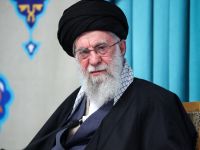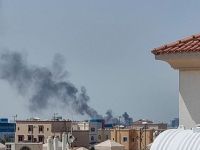Middle East-Report
Row Escalates over Oil and Gas Wealth in Mediterranean
The presence of huge oil and gas reserves in the eastern Mediterranean is threatening to spark conflicts between neighboring countries over what each country calls its right to natural resources in its territorial waters. While Cyprus and Israel have signed an agreement on the demarcation of their maritime boundaries allowing each country to begin exploitation of the oil wealth in its own territorial waters, this has irked Turkey which has warned the Greek Cypriot government against drilling.
In fact, a three-way row between Turkey, Cyprus and Israel over oil exploration in the eastern Mediterranean appears to be brewing, carrying with it the risks of a military confrontation.
The director of Cyprus' energy service Solon Kassinis told Reuters news agency on Sept. 19 that Cyprus has begun exploratory drilling for oil and gas in the eastern Mediterranean Sea – risking escalating tensions with Turkey. In a show of force, Turkey has sent warships to the disputed waters in the eastern Mediterranean following the Greek Cypriot government’s decision to begin drilling. The internationally-recognized Greek Cypriot government has confirmed it is to start drilling off the divided island’s south coast.
Turkey, which backs the breakaway state in northern Cyprus and maintains a military presence there, says any natural resources found offshore belong to both communities. Turkish Prime Minister Recep Tayyip Erdogan has repeated his country’s opposition to exclusive economic zones agreed by Cyprus and Israel last year and said they will start drilling work.
“We are also currently taking this step with Northern Cyprus and it could start in a very short time, possibly this week. We will initiate these works in our exclusive economic region,” Erdogan said in September. He added that the Turkish military would monitor the eastern Mediterranean with aircraft, frigates and torpedo boats. An Israeli firm has an option to join US company Noble Energy which has been commissioned by Cyprus to start the drilling work. That could exacerbate already heightened tensions between Turkey and Israel whose relations have been strained since Israeli troops killed nine Turks last year aboard an aid ship bound for Palestinians under Israeli siege in the Gaza Strip.
Provocation
Turkey has branded plans by Cyprus to begin oil and gas exploration in the Mediterranean as a “provocation” and “one-sided.” “If this fait accompli continues, we have steps of our own we can take. Northern Cyprus can carry out the same explorations with Turkey’s help. We will not accept any fait accompli. This must be understood by the international community,” Turkish Foreign Minister Ahmet Davutoglu said on Sept. 17. Cyprus has been divided since Turkey invaded the northern third of the island in 1974 in response to an Athens-backed coup d’etat.
In the meantime, Cypriot President Demetris Christofias has warned that Turkey’s moves to extract oil and gas from waters off the divided island are illegal provocations that risked a new conflict. “Turkish naval maneuvers in the region of Cyprus’s Exclusive Economic Zone, where exploration is being carried out, are provocative and a real danger for further complications in the region,” Christofias said in a speech to the U.N. General Assembly on Sept. 22.
New Alliances
Political analysts warn that the conflict over oil and gas deposits in the Mediterranean could lead to the emergence of new alliances by regional states aimed at protecting each state’s right to its natural resources in its territorial waters. George Alam, a political analyst with the Lebanese newspaper AL JOUMHOURIA, said that Turkey, which has been striving to play a major role in the Middle East’s complex politics, is now trying to impose itself as an authority to settle oil conflicts in the region. He said that Turkey’s recent diplomatic and media campaign against Israel was not only over last year’s Israeli attack on the Turkish aid ship bound for Gaza, “but was also over Israel’s oil policy which is based on unilateral action and monopoly.”
“Ankara is trying to impose itself as an authority of the Mediterranean oil, rejecting any participation by anyone in decision-making, even from the Israeli side. It is trying to send media messages to Tel Aviv, while the direct practical messages are meant for (Greek) Cyprus to prevent it from taking any step to explore for oil in its territorial waters before guaranteeing (Turkish) Cyprus’ share,” Alam said in a news analysis on Sept. 21. “There is a new map of interests in the eastern Mediterranean involving Cyprus, Israel, Lebanon, Syria and other states. Turkey is trying to make a show of force and domination. This equation can be true if the Americans had really authorized Turkey to do so,” he said.
Alam added that it was no exaggeration to say that U.S. Secretary of State Hillary Clinton had advised its Turkish counterpart Davutoglu “to keep the door open with Tel Aviv.” In other words, this means that Tel Aviv stays alongside Ankara to guard the oil boundaries, Alam said.
Referring to Lebanon’s oil dispute with Israel, Alam said now that the Lebanese Cabinet has approved the demarcation line of the country’s Exclusive Economic Zone (EEZ), “Lebanon should know how to balance the principles and interests and how it can stand in the face of Israel, Cyprus and Turkey to guarantee its oil interests without relinquishing its position on Israel, the Arab-Israeli conflict and the changes Syria is witnessing in its political, security and economic march which is open to all eventualities.”
“With deep regret, the Lebanese oil issue has entered the struggle of axes even before the water boundaries are drawn, before its economic zone is defined and even before Lebanon has obtained the approval of the United Nations and the concerned international authorities,” Alam said. “The oil wealth in the Mediterranean will definitely lead to a new political map of alliances from which Lebanon cannot stay aloof,” he added.
Essential Move
The demarcation line of Lebanon’s EEZ on Sept. 19 is an essential move for the cash-strapped country to go ahead with plans to drill for oil and gas in Lebanese territorial waters amid a dispute with Israel over a maritime area that spans some 860 square kilometers. The Cabinet’s move came amid a simmering dispute with Israel over offshore oil and gas reserves. In July, the Israeli government approved a map of its proposed maritime borders, a move which Lebanon described as an infringement on its natural gas and oil rights. The government also threatened to file a complaint against Israel under Chapter 7 to the U.N. Security Council.
President Michel Suleiman said Lebanon would uphold its rights over its territorial waters and EEZ against any designs by Israel. “We strongly uphold our full sovereignty and economic rights over our territorial waters and Exclusive Economic Zone as well as freedom of the exploitation of our natural resources, be they on land or in the deep sea, independently from any designs or threats,” Suleiman said in a speech at the 66th session of the U.N. General Assembly in New York on Sept. 21.
He said the Lebanese government had been in correspondence with UN Secretary General Ban Ki-moon on the extent of Lebanon’s waters and boundaries, “namely the geographic coordinates respectively pertaining to the southernmost and southwest border of the Exclusive Economic Zone of Lebanon.” Suleiman said Lebanon had expressed its objection to Israeli violations and aggression that affected these rights, and warned against “any initiative to exploit the resources of the disputed maritime zone.”
Lebanon warned the United Nations on Sept. 5 that Israel's proposed sea border threatens peace and security, as tensions rise between the neighbors over offshore oil and gas reserves. " "Foreign Minister Adnan Mansour has sent a letter to UN Secretary General Ban Ki-moon rejecting geographic coordinates Israel submitted to the United Nations concerning the northern part of the waters it claims," " the ministry said in a statement. It added that the Israeli claim " "infringes on Lebanon's Exclusive Economic Zone," " a sea zone that gives a state the right to explore its maritime resources. " "This is a clear violation of Lebanon's rights... over an area of some 860 square kilometers, and puts international peace and security at risk," " the ministry said.








